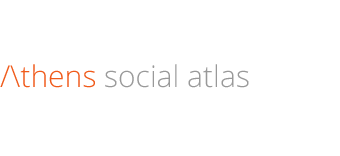Athens Social Atlas
The Athens Social Atlas aims at highlighting key structures and processes that constitute the city’s social fabric and to highlight the interactions between social processes and the built environment. Most of the entries in the atlas are based on current and past research on Athens that generated original datasets and led to novel analyses and findings, which to some extent remain little-known.
The entries are as diverse as the city they refer to, in terms of size and accompanying material. Some articles analyse the entire metropolitan area, for example the geographic distribution of Athenians according to their income. Others, on the contrary, focus on one residential quarter (for example, Kypseli) or even on one street only (Ippokratous Str.). The articles have been classified under thematic groups. In this sense, the atlas is more of a reference book, a broad thematic dictionary of Athens and not a traditional collective volume with closely related individual chapters that follow a central idea. In addition, the interpretations included in each entry do not necessarily reflect one overall viewpoint. They reflect the views of their authors, who were asked to express them freely, provided they could substantiate them.

